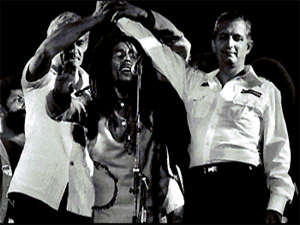|
Bob's flight touched down at
Kingston's Norman Manley airport on 26 February 1978; as it coasted to a
halt he was aware that this return was only worthwhile as a direct effort to
end the escalating violent hatred that was tearing
Jamaica apart and
terrifying its population.
Already the seeds for an end to this state of affairs had been sown. In
London earlier in the month, at the video shoot at the Keskidee Centre,
Bob
had been approached by gunmen of Jamaica's opposing political parties. They
asked
Bob if he would agree to take part in a "One Love Peace Concert" to
help bring an end to the island's murderous political rivalry. It was to be
held in Kingston on April 22, under the auspices of the Twelve Tribes of
Israel. Even these 'rankin'' gunmen had become aware that matters in Jamdown
were getting out of hand.
But flying in the face of most predictions, the concert was a resounding
success, a focus for the media of the western world. Sixteen of the island's
most significant reggae acts, including Jacob Miller and Inner Circle, The
Mighty Diamonds, Trinity, Dennis Brown, Culture, Dillinger, Big Youth,
Peter
Tosh and Ras Michael and The Sons of Negus appeared.
To coincide with the event, a new album was released by Bob Marley and The
Wailers --
Kaya, a collection of love songs and, of course, an homage to the
powers of ganja. During the concert,
Peter Tosh harangued Michael Manley and
Edward Seaga for persecuting ghetto sufferahs for their fondness for herb,
and lit up a spliff onstage.
Bob, however, seemed in a state of transcendental bliss. Instead of
attacking the prime minister and the leader of the opposition, he attempted
to bring them together. During 'Jamming' his dancing delivery and skat
extemporising on the lyrics showed someone taken over by the spirit:
'To make everything come true, we've got to be together, yeah, yeah. And to
the spirit of the most high,
His Imperial Majesty Emperor Haile Selassie I,
run lightning, leading the people of the slaves to shake hands. . . To show
the people that you love them right, to show the people that you gonna
unite, show the people that you're over bright, show the people that
everything is all right.
Watch, watch, watch, what you're doing, because . . . I'm not so good at
talking but I hope you understand what I'm trying to say. I'm trying to say,
could we have, could we have, up here onstage here the presence of Mr.
Michael Manley and Mr. Edward Seaga.
I just want to shake hands and show the people that we're gonna unite . . .
we're gonna unite . . . we've got to unite . . . The moon is high over my
head, and I give my love instead. The moon is high over my head, and I give
my love instead.'
As ghetto gunmen hovered on the edge of the stage,
Bob brought the hands of
Michael Manley and Edward Seaga together. And held them firmly together.
'Yes, the Peace,' he said later. 'Is really the Youth of
Jamaica started it
really. Asked me to help and get it together, y'know, knowing that I was one
of the victims during the time of the politics. This peace work, it don't
stop. . . it never stop . . . We know it never stop. That mean, we the youth
got a work to do.' |
